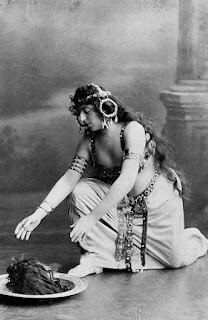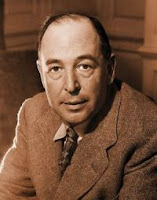Today’s gospel tells a story that is familiar to many of us. The story is all about a dance by the daughter of Herodias – her name never appears in the gospels, but the Jewish historian Josephus tells us she was known as Salomé, ironically, her name is derived from the Hebrew word for peace, Shalom.
Salomé has been the subject of many works of art – paintings, poems, operas, plays and films. Everyone from Theda Bara to Rita Hayworth has played her. More recently, she has appeared on television. Just a few weeks ago, Salome made an appearance on HBO’s supernatural vampire drama True Blood. That’s right, the dancing daughter of Herodias is, in this version, a 2,000 year-old vampire. When she is questioned about her past, particularly the Biblical stories about her, vampire Salomé says, "They made me a convenient villian, a symbol for dangerous female sexuality. But I was just a girl – with a severely dysfunctional family."
To say the least.
But let’s leave behind the more salacious aspects of our gospel reading today, and talk instead about why Mark may have included this story at this point in his gospel and what Mark may be trying to communicate to us with this story.
A few weeks ago, our gospel reading from Mark featured a textual technique called intercalation. In the reading that included the healings of Jairus’s daughter and the woman with a hemorrhage, we noted how Mark began the story of Jairus, then interrupted it with the story of the woman with the hemorrhage, before concluding the story of Jairus. Mark does this when he wants us to read two stories together, when he wants one story to inform our hearing of the other story, when the two stories together make a point that is best understood not from the viewpoint of one or the other, but from a point of view somewhere within the tension between the two stories.
In Mark’s gospel, we hear that John the Baptist has been arrested in chapter 1, five chapters and some time before the events in today’s reading. And in Mark’s chronology, it is after that arrest that Jesus begins his public ministry. One scholar looks at Mark’s account and says that John the Baptist is Jesus’s ‘mentor’; an interesting way of describing their relationship. Jesus does, in a sense, take over from John after John is arrested by Herod, and he continues John’s homiletical emphasis on repentance. What we can clearly see in Mark’s treatment of John and Jesus is that they are inextricably linked. John initiates Jesus into ministry with baptism, and the end of John’s public ministry is the beginning of Jesus’s.
Remember our gospel last week; we have been moving fairly sequentially through Mark’s gospel these last few Sundays. Remember that Jesus has been preaching and healing and then comes to Nazareth, where the doubts of the hometown crowd diminishes his power. He then sends the disciples out to heal and preach the gospel. Soon the disciples will return from their journeys to rejoin Jesus. But between the sending of the disciples and their return, Mark intercalates – inserts – the culmination of John the Baptist’s story. So we must hear this story of the demise of John in the context of the sending out of the disciples on mission.
And the story is, in brief, John has preached renewal and repentance to the people throughout Galilee. Like many a prophet before him, he has called for a return to righteousness. And like many a prophet before him, Nathan and King David & Queen Bathsheba, Elijah and King Ahab and Queen Jezebel, like Amos and King Jeroboam from our first reading this morning, John criticizes King Herod Antipas and Queen Herodias, for transgressing the laws of Israel.
Prophets and their kings and queens often have hostile relationships in the Old Testament. Sometimes they resolve their differences, and the words of the prophets are honored. Other times, the enmity remains. Notice in our reading today the king enjoys hearing John’s preaching, but he doesn’t want anyone else hearing it, so he keeps John in prison. When he is more or less tricked into it, he has John killed, not without some regret.
So, in our gospel reading today we have a prophet who preaches truth to power in the most direct, irrevocable way – a prophet who then is put to death by that same power.
Remind you of anyone? Of course it does. John’s demise is a prefiguration of the trial and death of Jesus.
Imagine reading the gospel of Mark for the first time, having never heard of Jesus or John or any of the familiar stories we know so well. Mark begins with John preaching and baptizing the people, including Jesus. Then John is arrested, and Jesus begins his preaching and healing. Then Jesus sends others out to preach in his name, and to heal under his authority. Then John is put to death by the powers-that-be, when his preaching hits too close to home, and threatens the authority that these powers-that-be claim for themselves. Imagine reading all this for the first time, up to our passage from Mark’s gospel today.
In such a case, what would you expect for the ‘main character’ of Mark’s gospel, Jesus of Nazareth? What might a first-time reader predict would befall another prophet who like John, takes on the more powerful powers-that-be? Yes, John’s execution is a little Calvary, and his fate prepares us for the fate that will befall Jesus.
But let’s also notice the intercalation of this story into the sending forth and the return of the disciples. Or as one colleague of mine describes it, they begin as disciples, but are turned into apostles; for in sending his followers, his disciples into the world to preach peace and to heal the wounded, Christ makes them apostles, from the Greek apostolos, one who is sent out. Many of these apostles will continue going out to preach the good news and very many of them would meet the same fate as John and Jesus.
So, what do you think that means for you and me?
If we choose to heed God’s word, to go out into the world as apostles, to heal the sick, to comfort the lonely, to seek justice for the oppressed, to feed the hungry – when we do that, as God calls us to do, can we expect an easy go of it? Can we expect the unjust and powerful to heed our testimony, and to fall in line behind us? Can we expect approbation and accolades from those whose iniquities and injustices we protest?
The 20th century Anglican theologian C. S. Lewis once said, “I didn’t go to religion to make me happy. I always knew a bottle of Port would do that. If you want a religion to make you feel really comfortable, I certainly don’t recommend Christianity.”
Our faith can be a comfort, that is true, and it can be a consolation in times of trouble. But while a comfort, it can also make us quite uncomfortable. It makes us question ourselves and our world. It causes us to look deeply into our behavior toward each other, especially our behavior towards those in need, those who suffer, who hunger and thirst. Our faith can make us all too mindful of our manifold sins and wickedness, as the old Prayer Book used to put it, and it can move us to do things like repent and make amends for our wrongs.
And there are things our faith does not do for us. It doesn’t spare us pain, though our faith can help us contextualize our pain, can help us to redeem it. Our faith doesn’t exclude us from loss, though it can be a consolation and comfort in times of loss.
It’s unfortunate that the coming into the world of the Incarnate God has become so closely associated with that character from the nursery, Santa Claus. Too bad, I say, because I think we are all too apt to confuse God with Santa. We think if we’re good little boys and girls, God will be like Santa and give us all that we would possibly wish for. But we know this is not the case. We can seek out God’s will for us; we can listen for God’s word in our day-to-day lives. But I don’t think it sounds like reindeer on the rooftop all that often. That’s not God in that tiny sleigh up there with all the goodies.
So, why follow in the footsteps of John and Jesus? Why the risk enmity with the world that they encountered?
We follow Jesus because we believe, not because we believe some good will come to us as a result. We follow Jesus because we long for justice to roll down like waters and peace like a mighty stream, not because we want justice only for ourselves, peace for our own kind alone. We live in the hope of Christ because the hope of Christ lives in us. And it is not a hope to be fulfilled by such worldly, transitory pleasures as praise and fame and wealth and power. It is a hope, that in God’s time, we will no longer need to speak truth to power, but will live in a realm of power that is founded upon truth, and in a place of peace that passes all understanding.
So, fight the good fight, be God’s apostles to this broken world. Feed the hungry, and ask the powers-that-be why they are hungry in the first place. Fight for justice that extends beyond your own backyard. And be not discouraged when you fall behind or fail. Be not downcast when you find yourself at enmity with the world. Because when you find yourself on the outs, on the losing side against the powers-that-be, that’s when you’ll know; you’re on the right side of God. +Amen.
© The Rev. Mark R. Collins




No comments:
Post a Comment